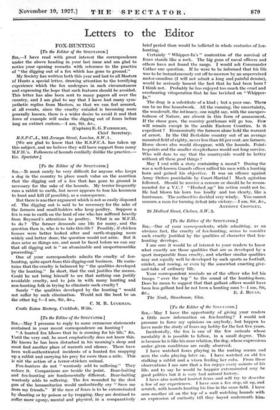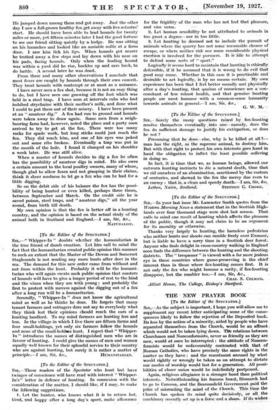[To the Editor of the SPECTATOR.]
Sin,—May I have the opportunity of giving your readers a little more information on fox-hunting? I would not presume to force my opinions on anybody, but happen to have made the study of foxes my hobby for the last five years. Incidentally, the fox is one of the few animals whose mentality it is possible to follow, in a small degree. This is because he is like his near relation, the dog, whose expressions under given conditions are easily observed.
I have watched foxes playing in the mating season and seen the cubs playing later on. I have, watched an old fox stalking a rabbit and a vixen feeding her cubs. From these observations I am sure that a fox enjoys every minute of his life, and to say he would be happier exterminated may be good politics but it is very bad natural history. I have also watched hunted foxes and will try to describe a few of my experiences. I have seen a fox stop, sit up, and scratch, with hounds hunting his line in the same field. I have seen another sit on the top of a wall watching hounds with an expression of curiosity till they bayed underneath him.
He jumped down among them and got away. Just the other day I saw a full-grown healthy fox get away with five minutes' start. He should have been able to lead hounds for twenty miles or more, yet fifteen minutes later I had the good fortune to see our friend sitting quietly by a hedge. He was sitting on his haunches and looked like an amiable collie at a farm door. I saw him lick his lips. When hounds got nearer he trotted away a few steps and lay down with his nose on his pads, facing hounds. Only when the leading hound was within a yard did he rise, hackles up and ears back, to do battle. A second later he was dead.
From these and many other observations I conclude that most foxes are caught by hounds through their own eonceit. They treat hounds with contempt or at most as a nuisance.
I have never seen a fox shot, because it is not an easy thing to do, but I have seen one gnawing off the foot which was held in a steel trap. I have seen at intervals cubs who had imbibed strychnine with their mother's milk, and done what I could to put them out of their misery. I have been present at an " amateur dig." A fox had run to ground and hounds were taken away to draw again. Some men from a neigh- bouring farm had, however, noted the place and a party soon arrived to try to get at the fox. There were too many rocks for spade work, but long sticks could just reach the fox. They did reach him, and one of his eyes was poked- out and some ribs broken. Eventually a trap was put in the mouth of the hole. I found it clamped on his shoulder a week later. He was still alive.
When a master of hounds decides to dig a fox he often has the possibility of amateur digs in mind. He also owes a certain amount to the local poultry owners, many of whom, though glad to allow foxes and not grasping in their claims,- think it sheer madness to let go a fox who can be had for a
little digging. _ So on the debit side of his balance the fox has the possi- bility of being hunted or even killed, perhaps three times, between September and March. On the credit side he is saved poison, steel traps, and " amateur digs," all the year round, from birth till death.
My own opinion is that the fox is better off in a hunting country, and the opinion is based on the actual study of the animal both in Scotland and England.—I am, Sir, &c., NATURALIST.















































 Previous page
Previous page